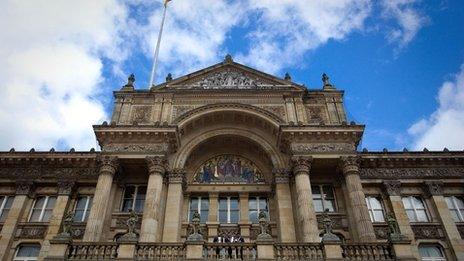Birmingham schools to be run by trusts?
- Published

How are Birmingham's schools going to be run after Ofsted delivers its inspection reports into the so-called Trojan Horse allegations?
The investigations following the allegations of extremism have raised major questions about the governance of schools in Birmingham - with the council having warned of "significant structural changes".
The creation of an independent trust - or smaller local trusts - to take over the council's services for schools is believed to be an option under discussion.
This could be a not-for-profit, arms-length body, commissioned to oversee Birmingham's schools. It would be likely to have a private contractor to provide support services.
Or there could be more than one trust, dividing up the city into smaller units.
Hackney trust
There is a precedent for such a take-over. More than a decade ago, after a series of damning Ofsted inspections, education services in the London Borough of Hackney were taken over by a "Learning Trust".
This trust was headed by a former Ofsted chief, Mike Tomlinson.
The creation of this trust has been widely seen as a success - with significant improvements in GCSE grades. Among the most high-profile success stories was replacing Hackney Downs school with Mossbourne Academy.
The head teacher of this school was Sir Michael Wilshaw, now the head of Ofsted and taking personal control of the inspection process in Birmingham.
The large size of the local authority has made it a difficult challenge for any firm or charity who might have been approached to run services.
As Sir Michael Wilshaw has said publicly about Birmingham, using a phrase from the bank crash: "If it's too big to fail, it's too big."
But there are examples of private sector education services working alongside local authorities. For instance Babcock works with Surrey County Council.
Superheads
There are other parts of the jigsaw and other possible approaches.
Birmingham has many excellent schools - and what would their relationship be with such a new form of supervisory oversight?
A number of the schools caught up in the Trojan Horse claims are academies - and if their current arrangements are dismantled, where would they be placed?
There have already been conversations about "superheads" taking over clusters of schools.
The heads of successful schools and academy trusts have been approached about taking over other schools in Birmingham.
Could these groups of schools and individual academies operate alongside an overarching trust? Or would there be a patchwork quilt of academy trusts and individual free-standing academies.
Imposing any such structure is going to have political difficulties - and for a coalition government heading towards an election, there will be risks in taking responsibility for something with plenty of scope to go wrong.
So the local authority might be the commissioner of such services.
The Trojan Horse might already have bolted - with the outcomes of the Ofsted inspections either already published or widely anticipated.
Governing the governors
But there are big questions raised about the governance of local school systems, beyond Birmingham.
In a system designed to promote local autonomy, who governs the governors? How are they held accountable?
How are the rising numbers of independently-run academies to be effectively scrutinised?
And if it relies on Ofsted inspections, then who inspects the inspectors? Schools about to be labelled as inadequate were previously being lauded as outstanding.
Tahir Alam, the chair of governors at Park View, at the centre of the Trojan Horse claims, is himself an Ofsted governor. As recently as last October he was carrying out inspections of schools on behalf of the education watchdog.
It's also important to remember that this isn't a political board game.
While there has been so much speculation, claim and counter-claim, there are pupils, parents and teachers worrying about what is going to be the impact on themselves and their families.
Parents still have not been given the Ofsted reports for their own schools.
Pupils are taking exams that will shape their futures and will want reassurance and confidence rather than uncertainty and disruption.